Personalized marketing is a marketing strategy that involves tailoring marketing messages, content, and products to individual customers based on their unique preferences, behaviors, and characteristics. It is a form of marketing that focuses on creating a personalized experience for each customer, rather than using a one-size-fits-all approach.
Personalized marketing can take many different forms, from personalized email campaigns to targeted social media ads. The key to effective personalized marketing is understanding your customers on a deep level and tailoring your marketing efforts to their unique needs and interests.
Imagine you walk into a clothing store and the salesperson greets you by name, knows your preferred size, and shows you the latest styles that match your taste. That’s personalized marketing at its finest. By recognizing and catering to your individual needs, the salesperson creates a memorable and enjoyable shopping experience that keeps you coming back for more.
In today’s digital age, personalized marketing has become even more important. With so much noise and competition online, customers expect brands to communicate with them in a way that feels personal and relevant. By leveraging data and technology, brands can create customized experiences that build strong, long-lasting relationships with their customers.
Let’s move ahead with this article and discover how marketing personalization with customer data can help digital marketers drive customer engagement and customer satisfaction, and upgrade their customer retention.
The Role of Marketing Personalization in the Customer Journey
Personalization plays a critical role in the customer journey, as it allows businesses to create a seamless and personalized experience for each customer at every stage of the journey using the customer data in hand. By understanding the customer journey, businesses can identify key touchpoints where personalization can make a significant impact.
The customer journey typically consists of several stages, including awareness, consideration, purchase, and post-purchase. Each stage requires a different approach to personalization, and understanding how to use personalization throughout the customer journey is essential in creating a seamless and personalized experience for each customer. Here is a visual representation of various customer stages and we will go more in-depth on how customers behave on each step.
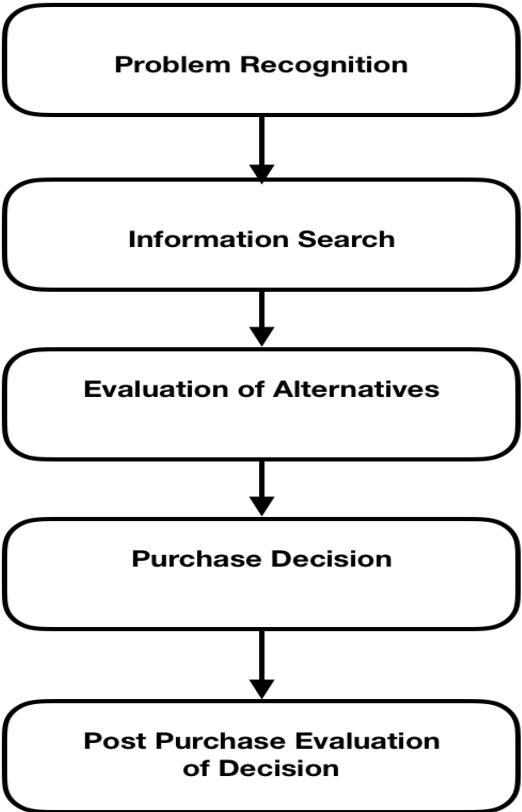
A successful personalized marketing campaign helps make the customer journey a lot better. Marketers look a lot friendly and your brand looks much more approachable and delivers better customer experience. A personalized marketing strategy drives brand loyalty and delivers the right marketing message to the customer based on buyer persona, and customer behavior. Marketing automation with personalized marketing efforts help marketer make their targeted marketing campaigns successful.
How to Use Personalization Throughout the Customer Journey
The customer journey refers to the process that a customer goes through when interacting with a brand, from the initial awareness stage to the final purchase and beyond. It is important to understand the customer journey in order to create effective personalized marketing campaigns.
At the awareness stage, customers may not be aware of your brand or the products or services that you offer. Personalization can be used to capture the attention of potential customers by providing relevant and personalized content that resonates with their interests. For example, if a potential customer is interested in travel, a personalized email campaign that highlights travel-related products or services can be highly effective.
At the consideration stage, customers are actively researching and considering their options. Personalization can be used to build trust and credibility with the audience by providing tailored content and recommendations that demonstrate a deep understanding of their needs and preferences. For example, a personalized product recommendation based on a customer’s purchase history can help build trust and credibility with the brand.
At the purchase stage, customers are ready to make a purchase. Personalization can be used to close the deal by offering customized product recommendations and targeted promotions that appeal to the customer’s unique needs and preferences. For example, a personalized discount code or promotion that is tailored to a customer’s interests can help increase the likelihood of a purchase.
Finally, in the post-purchase stage, customers have made a purchase and are enjoying the benefits of your products or services. Personalization can be used to build long-term relationships with the customers by providing personalized support, offering exclusive deals, and engaging with them on social media. For example, a personalized email campaign that highlights related products or services that a customer might be interested in can help increase customer loyalty and turn one-time customers into lifelong advocates for your brand.
Marketing Personalization to Serve Relevant Content and Product Recommendations
Personalized marketing involves providing relevant content and product recommendations that are tailored to each individual customer’s unique needs and interests. By analyzing and leveraging existing data for personalization, businesses can create relevant content and product recommendations that speak directly to each individual customer’s needs and interests.
Personalized content and product recommendations can be highly effective in building stronger relationships with customers and increasing sales and revenue. By providing content and recommendations that are tailored to each individual customer’s unique needs and interests, businesses can create a personalized experience that resonates with each customer and builds trust and loyalty with the brand. Here’s a representation prepared by Chandra et.al in their research on Personalized Marketing:
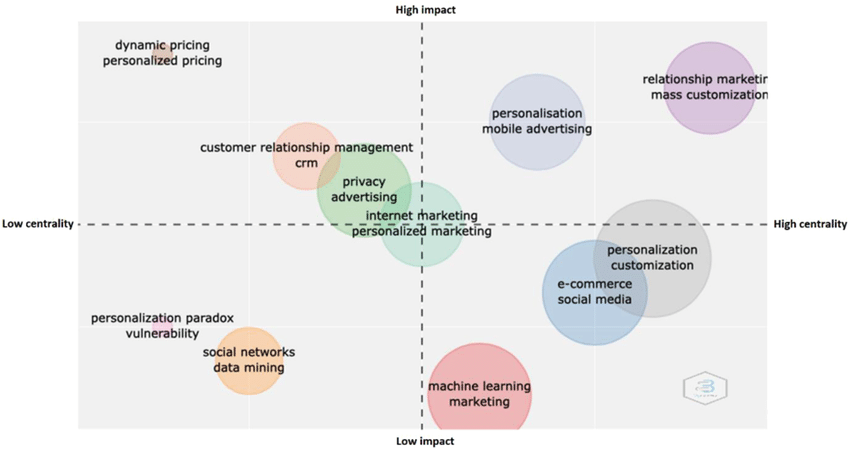
For example, if a customer has shown an interest in a particular product or service, a personalized email campaign that highlights that product or service and provides additional information or recommendations can be highly effective in increasing engagement and sales. Similarly, if a customer has purchased a product in the past, a personalized email campaign that highlights related products or services that they might be interested in can be highly effective in increasing customer loyalty and repeat purchases.
Using Purchase History to Generate Product Recommendations
Digital marketing combined with personalized messaging and personalized recommendations beats traditional marketing effort by miles! Prospective customers as well as existing ones love hyper-personalization to serve them and provide them with better recommendations.
One way to provide relevant product recommendations is by using purchase history. By analyzing a customer’s past purchases, businesses can identify patterns and similarities that inform their recommendations. For example, if a customer has bought running shoes in the past, a personalized email campaign that highlights related products such as athletic apparel or fitness trackers can be highly effective in increasing sales and repeat purchases.
Targeting Content Based on User Interests or Behaviors
Another way to provide relevant content and product recommendations is by targeting content based on user interests or behaviors. For example, if a user has read several articles about health and wellness, a personalized email campaign that highlights related products such as fitness equipment or healthy snacks can be highly effective in increasing engagement and sales.
Here are some insights according to research done by Clearbit and the results will make every business owner happy.
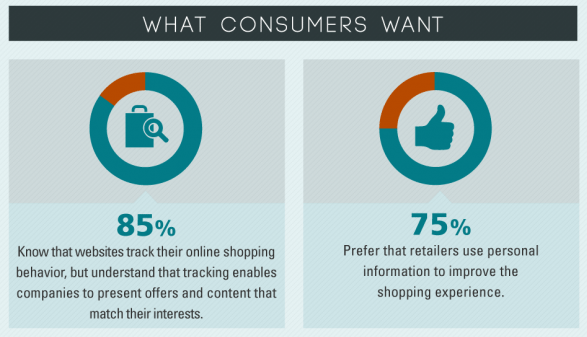
Similarly, if a user has shown an interest in a particular topic or product on social media, businesses can use targeted social media ads to provide relevant content and recommendations that speak directly to the user’s interests. By providing content and recommendations that are tailored to each individual user’s needs and interests, businesses can create a personalized experience that resonates with each user and builds trust and loyalty with the brand.
Utilizing Social Media Platforms for Relevant Content Delivery
Social media platforms like Facebook and Instagram offer powerful targeting capabilities that allow you to deliver content to specific audiences based on their interests, behaviors, and demographics. By using these platforms to deliver relevant content, you can reach your target audience and build stronger relationships with them.
For example, if a user has shown an interest in a particular topic or product on social media, businesses can use targeted social media ads to provide relevant content and recommendations that speak directly to the user’s interests. By providing content and recommendations that are tailored to each individual user’s needs and interests, businesses can create a personalized experience that resonates with each user and builds trust and loyalty with the brand.
Email Marketing and Personalization Efforts
Personalized email marketing is another key area where personalization can significantly impact your marketing efforts. By tailoring your email marketing efforts to the unique needs and interests of each individual customer, you can create a personalized experience that speaks directly to them and builds trust and loyalty with your brand.
Creating Unique Email Campaigns for Different Audiences
One way to personalize your email marketing is by creating unique email campaigns for different audiences. By segmenting your email list based on factors such as purchase history, engagement behavior, or demographics, you can create targeted campaigns that resonate with each audience.
Let’s take a look at this research conducted by Mckinsey & Company regarding customer preferences on marketing personalization.
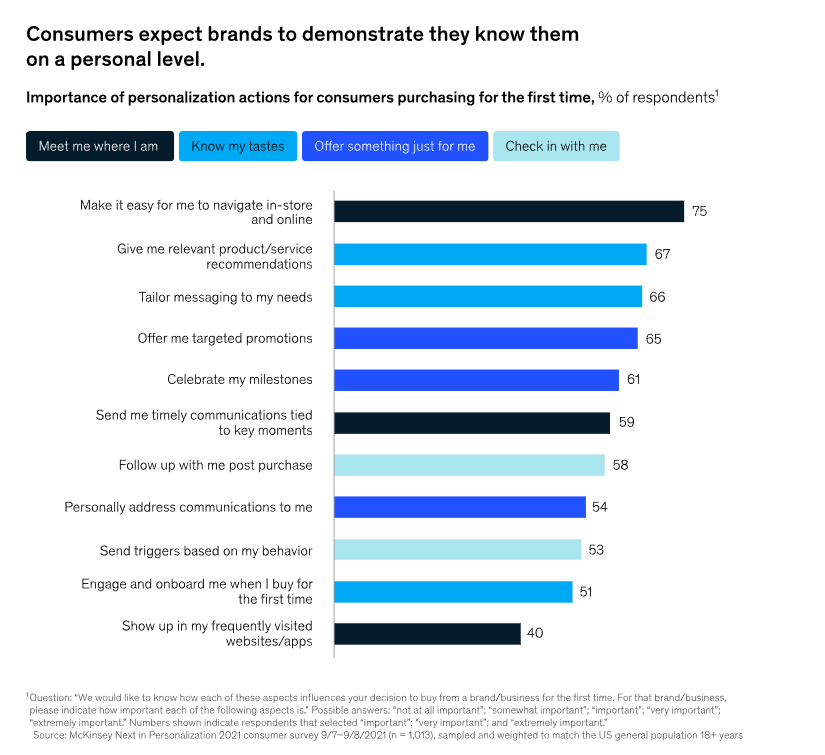
For example, if you have a customer who has recently purchased a product from your brand, you can send them an email campaign that highlights related products or services that they might be interested in. By providing relevant and personalized content, you can increase the chances of that customer making another purchase from your brand.
Crafting Engaging Subject Lines to Increase Open Rates
Another way to personalize your email marketing is by crafting engaging subject lines that speak directly to your audience. By using personalized language and addressing each individual customer by name, you can increase the chances of them opening your email and engaging with your content.
For example, if you have a customer who has shown an interest in a particular topic or product, you can craft a subject line that highlights that interest and speaks directly to them. This can help increase open rates and engagement with your email campaigns.
Incorporating Dynamic Content Into Emails
Incorporating dynamic content into your email marketing campaigns is another way to personalize your marketing efforts. Dynamic content allows you to create personalized content that changes based on each individual customer’s unique needs and interests.
For example, if you have a customer who has shown an interest in a particular product, you can incorporate dynamic content into your email that highlights that product and provides additional information or recommendations. This can help increase the chances of that customer making a purchase from your brand.
Build customer relationships with personalized marketing
Personalized marketing is not just about increasing sales and revenue; it’s also about building stronger relationships with your customers. By tailoring your marketing efforts to the unique needs and interests of each individual customer, you can create a personalized experience that builds trust and loyalty with your brand.
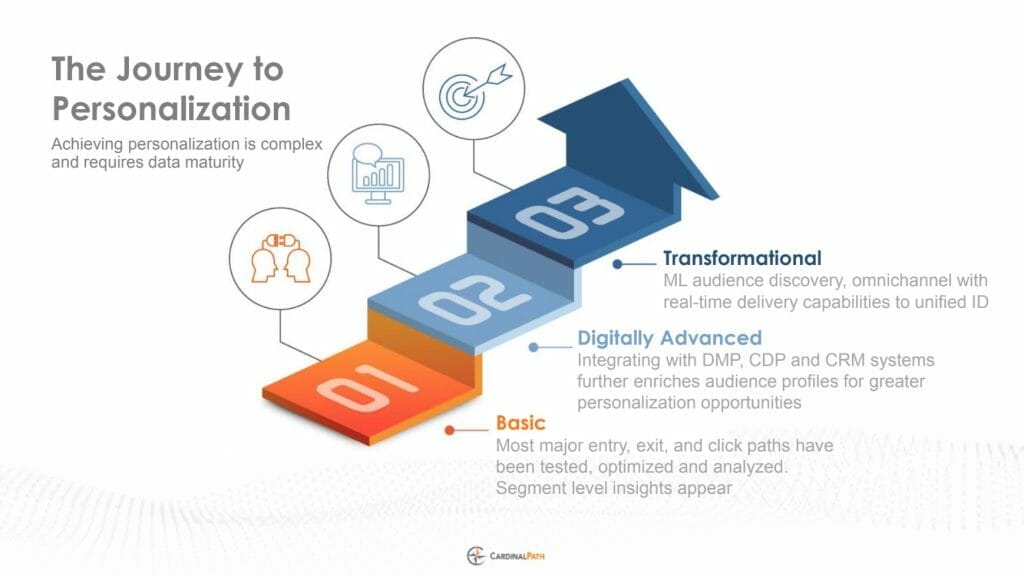
B2C Personalized Marketing
In the B2C market, personalized marketing can be highly effective in building stronger relationships with your customers. By using data and analytics to understand your customer’s unique needs and interests, you can create personalized marketing campaigns that resonate with each individual customer.
For example, if you have a customer who has shown an interest in a particular product or service, you can create a personalized email campaign that highlights that product or service and provides additional information or recommendations. By providing relevant and personalized content, you can increase the chances of that customer making a purchase from your brand and becoming a loyal customer.
B2B Personalized Marketing
In the B2B market, personalized marketing can also be highly effective in building stronger relationships with your customers. By understanding your client’s unique needs and challenges, you can create personalized marketing campaigns that speak directly to their pain points and offer solutions.
For example, if you have a client who is struggling with a particular challenge in their business, you can create a personalized email campaign that highlights your brand’s solutions to that challenge. By providing relevant and personalized content, you can increase the chances of that client becoming a loyal customer and increasing sales and revenue.
Personalized marketing examples
Personalized marketing can take many different forms, from personalized email campaigns to targeted social media ads. Here are some examples of personalized marketing in action:
Video Personalized Marketing
Personalized video marketing can be highly effective in building stronger relationships with your customers. By creating personalized videos that speak directly to each individual customer’s unique needs and interests, you can create a personalized experience that resonates with each customer.
For example, if you have a customer who has shown an interest in a particular product or service, you can create a personalized video that highlights that product or service and provides additional information or recommendations. By providing relevant and personalized content, you can increase the chances of that customer making a purchase from your brand and becoming a loyal customer.
Digital Advertising Personalized Marketing
Personalized digital advertising can be highly effective in capturing the attention of potential customers and driving sales. By using data and analytics to understand your target audience’s unique needs and interests, you can create personalized ads that speak directly to each individual customer.
For example, if you have a customer who has shown an interest in a particular product or service, you can create a personalized ad that highlights that product or service and provides additional information or recommendations. By providing relevant and personalized content, you can increase the chances of that customer making a purchase from your brand and becoming a loyal customer.
Social Media Personalized Marketing
Personalized social media marketing can be highly effective in building stronger relationships with your customers. By using data and analytics to understand your target audience’s unique needs and interests, you can create personalized content that speaks directly to each individual customer.
For example, if you have a customer who has shown an interest in a particular topic or product, you can create personalized social media posts that highlight that topic or product and provide additional information or recommendations. By providing relevant and personalized content, you can increase the chances of that customer engaging with your brand and becoming a loyal customer.
Conclusion
Personalized marketing is a powerful tool for building stronger relationships with your customers and increasing sales and revenue. By tailoring your marketing efforts to the unique needs and interests of each individual customer, a marketing team can create a personalized campaign that resonates with each customer and builds trust and loyalty with your brand.
Whether you’re using personalized email campaigns, targeted social media ads, or personalized videos, personalized marketing can help you stand out in a crowded marketplace and create a unique and memorable experience for each customer.
By analyzing and leveraging existing data for personalization, you can create relevant content and product recommendations that speak directly to each individual customer’s needs and interests. By building customer relationships with personalized marketing, you can create a loyal customer base that continues to support and promote your brand for years to come.
In conclusion, personalized marketing is no longer a nice-to-have; it’s a necessity in today’s competitive marketplace. By embracing personalized marketing and creating a unique and personalized experience for each customer, you can build stronger relationships, increase sales and revenue, and create a loyal customer base that supports and promotes your brand for years to come.


